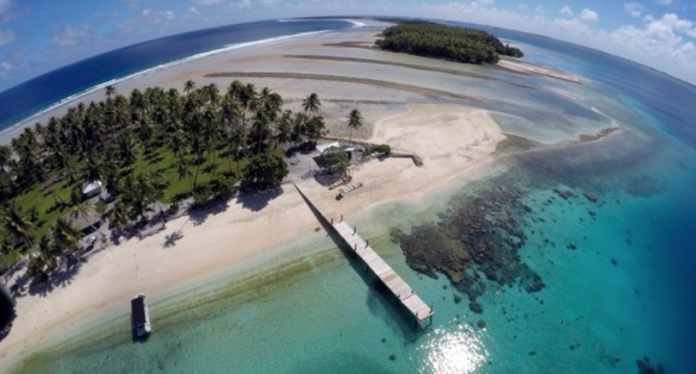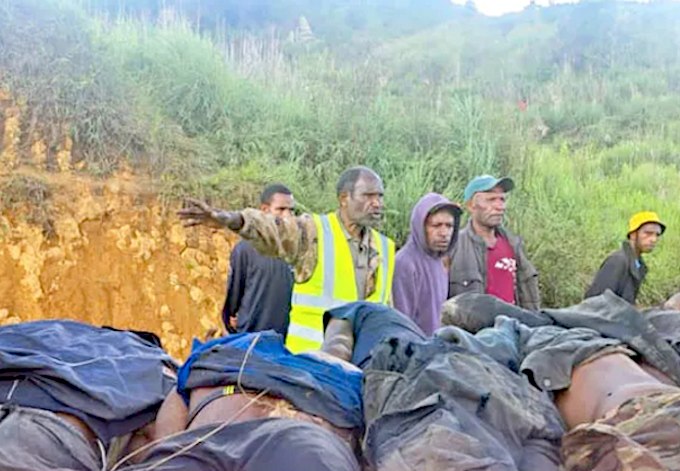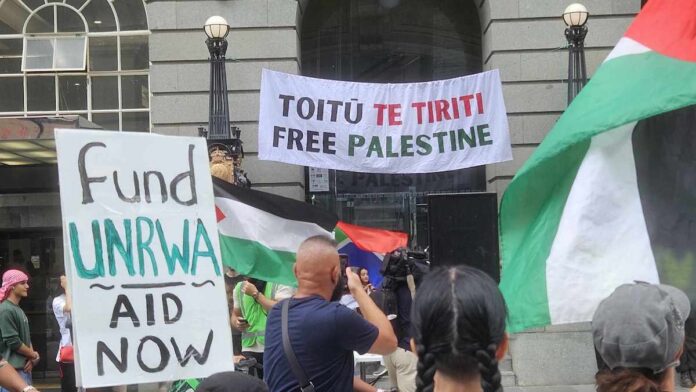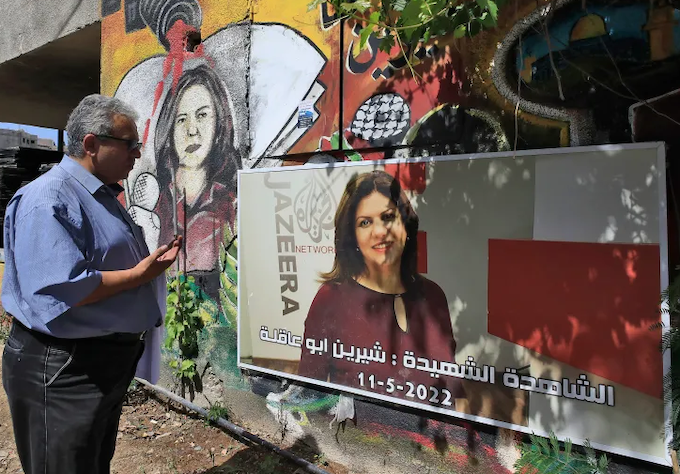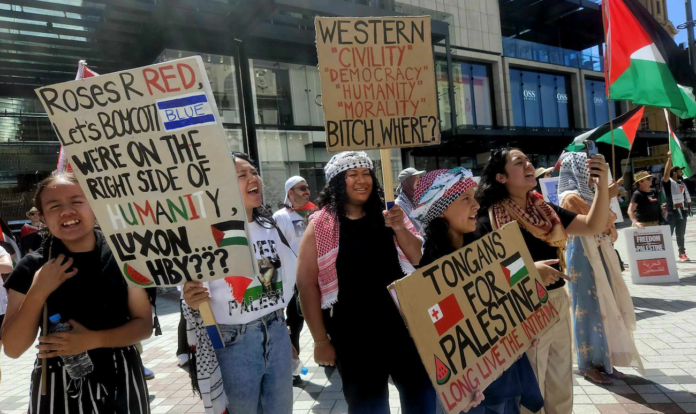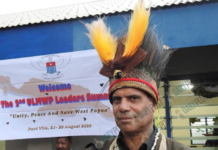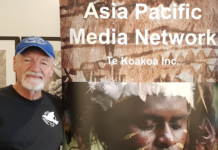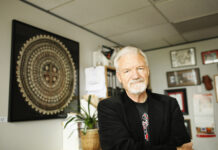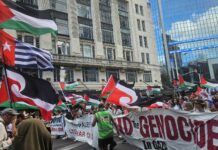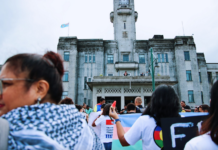GREEN-LEFT EXCLUSIVE: Leila Khaled talks to Peter Boyle
Leila Khaled is an iconic Palestinian revolutionary activist. A famous mural of her (pictured above) adorns an Israeli apartheid wall isolating the West Bank in Palestine. She is a member of the national committee of the Popular Front for the Liberation of Palestine (PFLP) and a representative on the Palestine National Council. She lives in exile in Jordan today and gave this exclusive interview to Green Left on February 18.
By Leila Khaled and Peter Boyle
As the Israeli military commences its assault on Rafah, Benjamin Netanyahu’s regime is not even pretending to abide by the interim orders of the International Court of Justice (ICJ). What is your assessment of the ICJ case and the responses of the various world powers to its interim orders and the continuing genocide in Gaza?
Leila Khaled: South Africa, which is trying to prove in the ICJ that Israel is committing genocide, is now following up the case (as are other countries like Nicaragua) because Israel is not abiding by any rules of the court.
And there is a lot of pressure on Israel now. On February 26, the ICJ will have its second meeting [on the genocide issue] and now there is a lot of pressure on the court to meet because Israel is declaring they are going to attack Rafah.
There are 1.5 million people in Rafah now because they drove people from the north and from the city of Gaza to the south. They went there but now [Israel] won’t allow them to go back to their homes, even if they were not bombarded . . .
Israel is acting like it is above international law.
Israel is now already attacking Rafah. They are not on the ground yet but they are bombarding it by planes.
Until now the United States administration is not putting enough pressure on Israel. It is the only government that can put the pressure that is needed to stop the genocide in Rafah.
Israel says that they will open a safe road [out from Rafah].
Where to? There is no safe place in the whole Gaza strip.
Palestinian revolutionary Leila Khaled speaks out. Video: Green Left
The Israeli military is still in Khan Younis, a city beside Rafah, and when people went out of the hospital there were snipers who killed four doctors and they arrested the other medical workers.
So people could not leave Khan Younis to come to Rafah. Rafah is also a very small district to have so many people there.
Now it is time for people who demonstrated to support the Palestinians — and against the atrocities that Israel is committing — to pressure their governments which, like in Australia, are supporting Israel.
The attitude of the Australian government is that Israel has a right to defend itself. But Israel is not defending itself, it is attacking for four months!
Most of the casualties are women and children when they bombard and destroy their homes.
People have nowhere to go today unless the Rafah border is opened. But it is not opened yet [even] to receive humanitarian aid like medicines and food, even though the ICJ ordered Israel to let aid in to all parts of the Gaza Strip, especially in the north . . .
The Egyptians have the sovereignty over the Gaza Crossing but Israel does not allow anybody to go out or in. So it is a siege . . .
Governments are supposed to abide by rules but Israel is not following the ICJ’s [interim] orders. So they should take action. For example, they can cut diplomatic relations to pressure Israel to stop its genocide.
They can boycott Israeli products. This would put pressure on Israel.
But until now the governments that follow the US government are not taking those steps. They just hear their people shouting in the streets.
Stop arming Israel
Green Left 1399 out now
Read it online 👉https://t.co/CcSvr4Ri2r pic.twitter.com/XrsFYSlndx— Green Left (@GreenLeftOnline) February 16, 2024
The Zionist regime has told many lies about October 7 to justify its latest genocidal attack on Gaza. What is the PFLP’s understanding of the reason for and what really happened in Operation Al-Aqsa Flood?
Leila Khaled: The freedom fighters did not attack ordinary people [on October 7] , they attacked the military settlements. But when the borders were open some other people took civilians.
Neither Israel nor the Western media could prove that there were massacres.
The civilian hostages [who were released in one of the deals negotiated] said they were dealt with very kindly . . .
So why are they speaking like this about massacres? Just to say that the freedom fighters are terrorists.
In international law, people who are under occupation have the right to defend themselves with all means, including armed struggle. And this was armed struggle.
We have the right to defend ourselves from occupation and the siege of Gaza.
So they made lies because they did not have any evidence. Even when [US President Joe] Biden showed some pictures, CNN said that he did not have evidence that this was what happened on October 7.
People around the world have been demonstrating because they know about the siege of Gaza that has been going on for 17 years. Israel has carried out a lot of attacks on the people of Gaza. Four times they attacked Gaza and caused many casualties, in the first attack killing about 2000 children. The second time they killed more than 2000 children. And then there was a third and fourth attack on Gaza.
What is the real reason that the US and its closest allies — including, shamefully, Australia — support the Zionist state?
Leila Khaled: Because this was their original project in 1948 for establishing a colonial settler state, Israel, occupying the land of Palestine. Because it protects their common interests.
This is why even yesterday Biden declared he would send $15 billion to support Israel.
Those countries that share the interests of the US administration support its policy which has ended up with this war against the Palestinian people, not against Hamas . . .
Hamas is part of the Palestinian resistance and are also freedom fighters.
What is your assessment of the so-called two-state “solution” that was begun with the Oslo Accords? Has it failed? If so, what would be the alternative and how can it be won?
Leila Khaled: This illusion of the two-state solution has been set for 40 years but they didn’t implement it. So that we don’t have any freedom in our occupied country.
The Oslo Accord stated Israel will withdraw and allow a Palestinian state. But Israel did not abide by the agreements that were signed . . .
In 1949 the UN declared that there would be two states, one a Jewish state and an Arabic state — not a Palestinian state.
But Israel also turned its back on all the UN resolutions that have been taken over the years.
For us, to solve the problem it has to be recognised, first, that Israel does not have the right to occupy Palestine and, second, the right of return for the Palestinians. This is the key to solving the conflict…
The UN hasn’t implemented its resolutions up until now.
Israel has denied our right of return even though it was a condition in the 1948 UN resolution. Israel would be accepted as part of the international community and have a state in Palestine on condition that the Palestinians had the right of return.
Because of the balance of forces at the time, Israel was accepted as a nation while the Palestinians remained refugees.
I am one of those refugees as a result of the crime that happened in 1948.
Now we are calling for a democratic state, with the return of the Palestinian refugees. Then, we can altogether live in Palestine and decide what kind of state we need.
Without this, the struggle will continue from generation to generation.
The Palestinians who are fighting today are the fourth generation.
There are also refugee camps in the West Bank, like Jenin, and we have seen them attacked and houses demolished on a daily basis.
Israel has arrested about 6000 people in the West Bank on top of the 7000 people who were detained before . . . So we are calling for the release of these political prisoners in exchange for the hostages held by Hamas, who are all Israeli military.
There were no Israelis in Palestine before 1948. There were Jews who were Palestinians but we don’t discriminate on the basis of religion. The Zionist movement brought people to Palestine after World War II to establish an Israeli state, which was guaranteed by the British colonial government of that time.
We had our identity as Palestinians, including the Jews who were living with us. We didn’t drive out the Jews from Palestine. Its history, Palestine is Palestine.
Now the balance of forces is coming a little bit more in our favour. It is a step forward that people around the world have declared their support for free Palestine. “Free Palestine” has become a slogan of the peoples of the world, including in Australia . . .
But the Australian government, which is still under the British crown, is supporting Israel along with the other colonial powers.
The latest Zionist genocidal war on Gaza has cost so many Palestinian lives but the there has also been a historic global mass solidarity for Palestine and opposition to this war — on a scale not seen since the Vietnam War. A whole new generation of activists has stepped forward in this movement. What is your message to this new generation of solidarity activists? What lessons can you share from your own experience of a life in struggle?
Leila Khaled: I would say we are thankful for all those who have declared this attitude to the Palestinians and what is happening in Palestine. The peoples of the world now understand the core issues of this struggle — and we, the Palestinians, will not forget this — that in this war, Israel is doing genocide.
I saw on the TV, and from the video that comrades sent from Australia, the huge demonstrations in Melbourne and Sydney which showed that people began to realise the reasons behind what is going on.
They are demanding that the Israeli army cease fire and withdraw from the Gaza Strip and the West Bank.
This is what I am telling the world’s people, especially the new generation: Keep on fighting for just causes.
The Palestinian cause is a human cause. Now we are defending humanity, not only in the Gaza Strip . .
We are trying to build a new history in the region against the imperialists, especially American imperialism, because they are the ones who launch wars and they are supporting Israel with all means and new arms . . . But they don’t give anything for the children of Palestine.
Leila Khaled will be a featured international speaker at the Ecosocialism 2024 conference in Perth from June 28-30. Ecosocialism 2024 brings together ecosocialist activists from around the Indo-Pacific region. Republished from Green-Left with permission.


